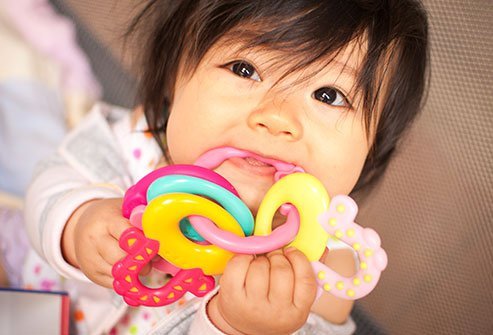Why Do Babies Get Fever When Teething?

Teething, which is when a baby’s teeth first start to break through their gums, can cause pain and discomfort and be a frustrating experience for both parents and their babies.
However, contrary to popular belief, teething doesn’t cause fever in babies. Since 2016, studies have shown that while teething does cause a slight increase in temperature, it won’t cause enough of an increase to cause a fever.
A baby’s temperature while teething may range between 99-100 degrees F. A fever, however, is defined as a temperature of 100.4 degrees F or higher. If your baby experiences a fever while teething, an unrelated illness may be the cause.
When does teething begin for infants?
Teething usually begins when babies are around 4-8 months and continues until 30-36 months of age. Initially, the lower front teeth appear, and finally, the last set of molars appears.
The general order in which primary teeth break through the gums is as follows:
- Central incisors: 6-12 months of age
- Lateral incisors: 9-16 months of age
- Canine teeth: 16-23 months of age
- First molars: 13-19 months of age
- Second molars: 22-24 months of age
By age 6-12, the roots of 20 baby teeth loosen and fall out, which are then replaced by 32 permanent adult teeth. Wisdom teeth (third molars) generally come out in middle to late adolescence.
What are signs and symptoms of teething?
Some babies may experience the following symptoms during their teething period:
- Irritability or fussiness that comes and goes
- Disrupted sleep
- Swelling or inflammation of the gums
- Drooling
- Loss of appetite
- Rash around the mouth
- Mild temperature
- Diarrhea
- Increased biting
- Gum-rubbing
- Ear-rubbing
- Decreased interest in solid foods
- Chewing on toys or other objects
- Bringing hands to mouth
Teething is never associated with the following:
How can you ease your baby’s teething discomfort?
You can ease your baby’s teething discomfort with these tips:
- Gently rub their gums with a clean finger, small cool spoon, or moist gauze pad.
- Try to keep their mouth and neck area as clean and dry as possible to prevent rashes.
- Provide a clean teether to your child for them to chew. Teethers should be made of solid rubber. Avoid liquid-filled teething rings or plastic objects that could break easily.
- Cool objects can soothe your baby’s gums. Make sure these objects aren’t too cold. Keep a teething ring in the fridge for a few minutes before giving it to your baby. You can also use a wet washcloth instead of a teething ring.
- Avoid using gels and teething tablets because they may have benzocaine or belladonna, which can be poisonous.
- If your baby is over 6 months old, you can give them ibuprofen or acetaminophen to help relieve teething pain. However, check with your doctor first. Avoid using numbing gels or homeopathic medication.
